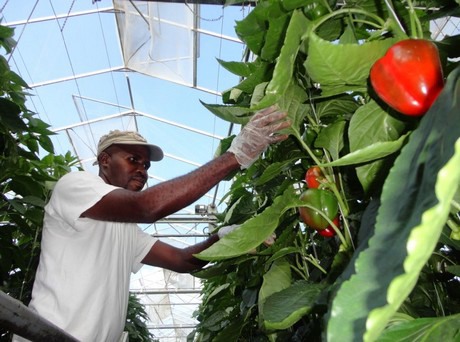
Employee harvesting pepper. To keep pests outside, the Lucayan greenhouse has special insect netting at the ventilation panes.
LTP was founded in 2001 with the aim of providing locally grown, high quality produce to the domestic market. In order to achieve this goal, the focus from day one has been on utilizing the latest in technology. A Dutch company, named Dalsem, was hired to design, supply and build a Venlo style greenhouse which was completed in 2004, equipped with the latest in hydroponic growing systems. Once the construction was completed, LTP began production of the first greenhouse crops in the Bahamas. This production has since expanded to include traditional greenhouse crops: cucumbers, sweet peppers, tomatoes and greens, as well as some more specialist crops and plants including herbs, houseplants, dune restoration plants, seedlings, as well as seasonal and varietal specialty lines.
“In the Bahamas, it has traditionally been more efficient for the international hotels, restaurants and retail customers to import produce rather than to support local agriculture", said Tim Hauber. "The last ten years have been very interesting for our company as we have had to change the market psychology to move towards supporting locally-grown fresh produce.”
Hauber explains that: “There is adequate land and some islands have the fresh water necessary to grow produce and other types of food. Our climate is very good for growing, and with a few modifications to traditional thinking, the Bahamas make a great place for a greenhouse. In regards to cultivation, it gets a little difficult in the summer when the high night temperatures are a problem, but we can grow all year long.”
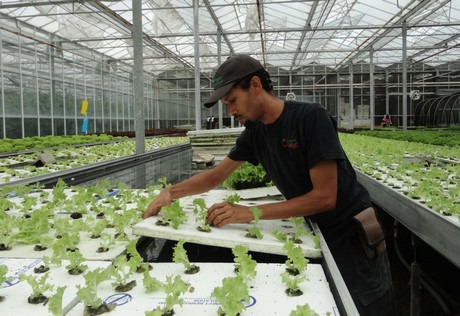
The cultivation schedule in the Bahamas can be compared to the schemes in Spain and Mexico. However, greenhouse growing in a nation where nearly everything must be shipped in via ocean freight, provides some interesting challenges for Lucayan. “We are on an island, so everything, from seed to packaging, must be imported,” said Hauber, “Obviously there are costs associated with that, which has caused us to be very efficient on how we manage our operation.”
When pressed for examples Hauber explained: "For example, Lucayan uses biological crop protection in an attempt to limit the use of agrochemicals from a sustainable point of view, using beneficial insects as natural predators in the greenhouse to control whitefly, thrips and other disease carrying insects.”
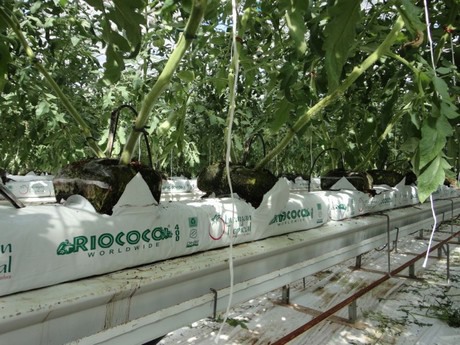
Riococo cocoslabs together with Riococo coir propagation blocks
Another example offered was the use of compressed coco peat slabs versus rockwool in reducing the amount of container space. "We have been growing on Riococo slabs for a few years now and we have found that this not only saves the company money on shipping costs but it also makes us help grow a better crop” Hauber said. Lucayan is growing on a coarse mix with more chips, which helps Lucayan avoid a vegetative crop in the beginning of the cultivation cycle when it can still be very hot and sunny.
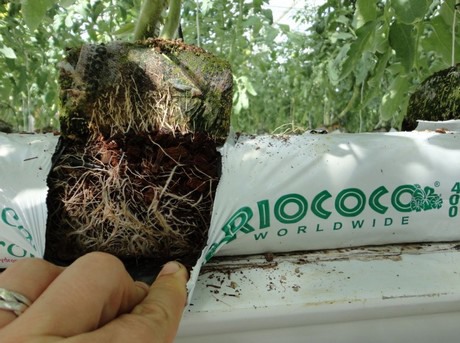
Healthy rooting
Currently, Lucayan is also conducting a large trial with coir propagation blocks from Riococo and so far, the growers at Lucayan are really positive about the coir propagation block. "We have not seen any problems after transplanting the crop. Last season we did a small trial in the spring while inter-planting in order to test if a transition would be feasible. Growing on coco slabs in combination with the coir blocks is really a top notch combination. It helps us to manipulate the irrigation of the crop because we can dry out the slabs out a little better thus creating a more generative growth, producing more fruit instead of leaves” says Hauber.
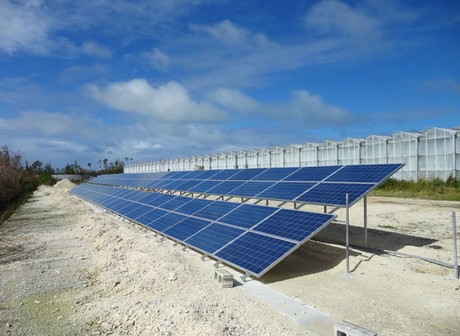
PV-panels outside the greenhouse to generate sustainable electricity
In addition to developing ways to successfully grow crops in a protected environment during high temperature periods, Lucayan has implemented an integrated pest management bio-control approach which means that their production is pesticide free. This is an important and growing consumer requirement internationally, not only in the Caribbean region. Lucayan has also found great success in its partnership with Bahamas Food Services Limited (“BFS”) which is the country’s largest food distributor. Hauber says, “BFS is not only highly supportive of Lucayan, but also runs a very efficient operation that services almost every hotel and restaurant in the country. They are encouraging Lucayan to grow more local vegetables because the quality is recognized as being world class.”
On the crop selection side, Lucayan has found a cucumber variety that thrives in the Bahamian environment and this now supplies a large part of the country’s demand. Lucayan sweet peppers have achieved a similar level of market domination in the Bahamas.
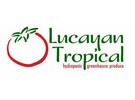 For more information:
For more information:Lucayan Tropical Produce
www.lucayantropical.com
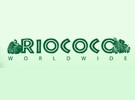 Riococo
RiococoShan Halamba - [email protected]
www.riococo.com

Hort Americas, LLC
Chris Higgins [email protected]
www.hortamericas.com
